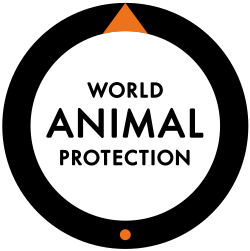World Animal Protection
 |
|
| Founded | 1981 |
|---|---|
| Type | Non-governmental organization |
| Focus | Animal protection |
| Location |
|
| Origins | WFPA and ISPA |
|
Area served
|
World |
|
Key people
|
Paul Baldwin, President Steve McIvor, Chief Executive |
| Mission | We move the world to protect animals |
| Website | worldanimalprotection |
World Animal Protection (formerly The World Society for the Protection of Animals) is an international non-profit animal welfare organization that has been in operation for over 30 years. The charity describes its vision as: A world where animal welfare matters and animal cruelty has ended.
The charity has regional hubs in: Africa, Asia, Europe, Latin America and North America, and offices in 14 countries. The international office is in London.
The organization was previously known as the World Society for the Protection of Animals (WSPA). This resulted from the merger of two animal welfare organizations in 1981, the World Federation for the Protection of Animals (WFPA) founded in 1953 and the International Society for the Protection of Animals (ISPA) founded in 1959. In June 2014, the charity became World Animal Protection, at a cost of £168,000.
In 1985 WSPA launched a campaign to outlaw bullfighting in cities in France and Spain.
In the 1990s, the charity contributed to the prohibition of bear dancing in Greece, Turkey and India. In India, the charity funded a sanctuary for bears previously used in the trade.
After a BBC investigation in September 2013, the charity launched a campaign against the caged civet coffee trade. Several retailers have since stopped selling coffee produced by caged civets.
The charity campaigns in Asia for an end to the bear bile industry. In Pakistan they work to end bear baiting by campaigning for a change in law, offering alternative livelihoods to bear owners and housing bears rescued from bear baiting in a purpose built sanctuary.
The organization is working to end the inhumane culling of stray dogs, which many countries do in a misguided effort to eliminate rabies. The organization points out that vaccination programs are the only effective way to eliminate rabies, and work with governments on vaccination programs. In 2012, a mass vaccination program was started in the Shaanxi, Guizhou and Anhui provinces of China, working with the Chinese Animal Disease Control Centre; as of June 2014, 750 veterinarians have been trained and over 90,000 dogs have been vaccinated. Mass vaccination programs have also been delivered in Bali, The Philippines, Bangladesh, Kenya, Zanzibar, and Kathmandu, Nepal.
...
Wikipedia
